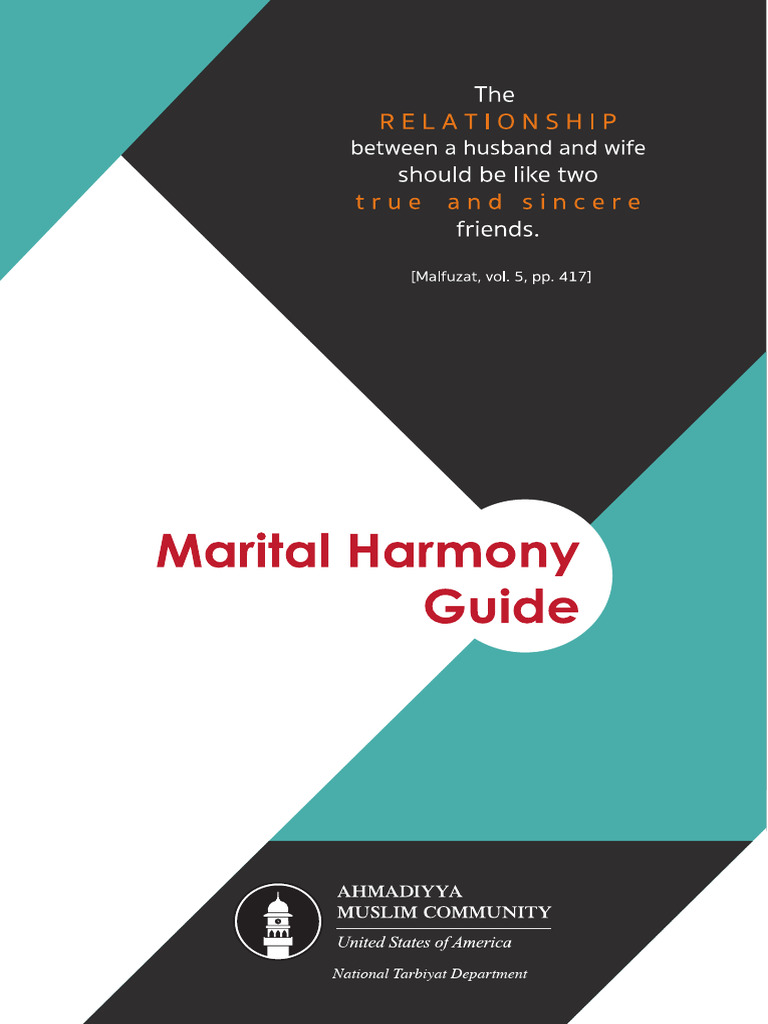Marital harmony is a profound aspiration within the Baha’i Faith, encapsulated in the concept of two individuals merging to form a single soul. This principle underscores the importance of unity, love, and cooperation as foundational pillars for a successful marriage. As individuals navigate the intricate landscape of romantic partnerships, Baha’i teachings provide a robust framework for nurturing harmony and fostering genuine connection.
The quintessential belief in the oneness of humanity extends seamlessly into the realm of marriage, illuminating how relationships can serve as a microcosm of greater societal unity. Central to these teachings is the recognition that as partners strive to achieve oneness in their union, they not only enrich their personal lives but also contribute to the collective fabric of humanity.
1. The Concept of Oneness in Marriage
The Baha’i perspective emphasizes a paradigm wherein marriage is not merely a contractual arrangement but a spiritual partnership. This notion of oneness implies that both partners commit to transcending their individual desires and ambitions, seeking instead a collaborative path that honors the unique qualities each brings to the union. In practical terms, this may involve recognizing and valuing differences in background, perspectives, and experiences, which can ultimately serve to enhance the partnership.
By embracing this duality, couples can learn to navigate conflicts with grace, utilizing challenges as opportunities for growth and deeper understanding. In many ways, this spiritual dimension of marriage transforms the relationship into a sacred enterprise aimed at mutual upliftment and the cultivation of virtues such as patience, kindness, and forgiveness.
2. The Role of Consultation
Consultation stands as a critical mechanism within the Baha’i framework, transforming decision-making and conflict resolution into collaborative processes. Partners are encouraged to engage in open dialogue, examining issues from multiple angles and seeking consensus rather than pursuing unilateral decision-making. This healthy practice of consultation facilitates deeper intimacy, engenders trust, and fosters a climate where both voices are heard.
The art of consultation necessitates a commitment to actively listen and a willingness to set aside personal egos for the greater good of the relationship. To this end, couples are encouraged to create a regular practice of consultation, which may include setting aside time to discuss important decisions, reflect on mutual aspirations, and reassess their journey together as partners.
3. Education and Personal Development
An essential tenet of Baha’i teaching is the pursuit of knowledge and self-improvement. Within the context of marriage, this ethos manifests as an encouragement for each partner to seek personal growth. Couples are advised to support one another by sharing educational experiences, whether through formal study, engaging in artistic pursuits, or becoming involved in community service. This commitment to education not only enhances personal development but also contributes to a more profound connection between partners.
Through the lens of shared experience, couples create a bond that is reinforced by mutual respect and understanding. This shared pursuit of knowledge can become a sanctuary where both partners grow individually and collectively, forging a deeper emotional and spiritual connection.
4. The Importance of Equality
The Baha’i teachings underscore the fundamental equality of men and women, a principle that serves as a cornerstone for marital harmony. In a Baha’i marriage, both partners are regarded as equal contributors to the union, with rights and responsibilities that are not only comparable but also complementary. This equality fosters an environment of mutual respect, where both individuals feel valued and empowered to express their thoughts and emotions.
Fostering equality requires ongoing vigilance and a commitment to challenge societal norms that may seek to undermine this principle. Couples often need to engage in active reflection on their roles within the relationship, ensuring that neither partner is relegated to a subordinate position. In this manner, the relationship flourishes through collaboration and mutual support, creating a dynamic of partnership that transcends traditional gender roles.
5. Spirituality and Prayer
A spiritual foundation is integral to marital harmony. The Baha’i teachings encourage couples to engage in shared spiritual practices, such as prayer and meditation, which can create a deeper sense of connection and purpose. This shared devotion not only strengthens individual faith but also enhances the spiritual dimension of the relationship, allowing partners to align their aspirations and values.
Incorporating spirituality into everyday life empowers couples to navigate life’s challenges with grace and fortitude. Regularly invoking prayer as a couple can serve to infuse solace during times of difficulty and reinforce their commitment to each other and to a higher purpose.
6. Serving Humanity Together
One of the highest callings within the Baha’i Faith is service to humanity. Couples striving for marital harmony are encouraged to engage in collective acts of service, which can significantly deepen their bond. By participating in community initiatives or charitable endeavors together, partners contribute not only to the well-being of others but also to their own growth as individuals and as a couple.
This shared commitment to service creates a palpable sense of unity, reinforcing the notion that their partnership extends beyond personal interests and into the realm of societal advancement. In essence, by working together towards a common goal, couples can transcend the confines of their relationship, contributing to a more harmonious and just world.
Conclusion
The Baha’i teachings provide a comprehensive framework for cultivating marital harmony. By embracing the principles of oneness, consultation, education, equality, spirituality, and service, couples can forge a relationship that thrives on mutual respect and shared aspirations. As they navigate the complexities of life together, they have the opportunity to embody the ideals of the Baha’i Faith, becoming exemplars of love and unity in an increasingly fragmented world. Ultimately, the aspiration to form a single soul through the sanctity of marriage emerges as a transformative spiritual journey, one rich with possibility and profound rewards.
